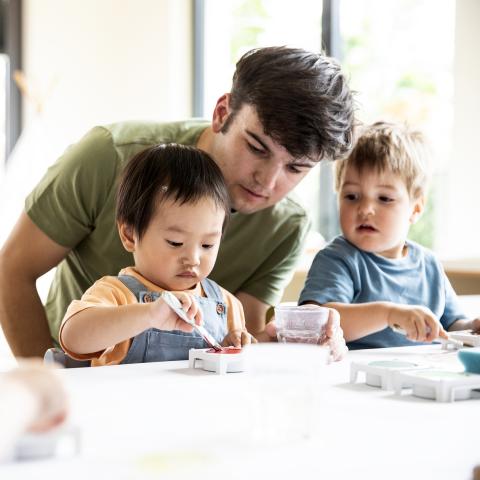
The pedagogy of the Wichtel Akademie
Our educational concept for a happy childhood
"For a happy childhood" is our guiding principle at the Wichtel Akademie. Modern, sophisticated pedagogy, committed staff and trusting cooperation with parents are the basic prerequisites for us to enable every child to have a happy childhood.
Modern pedagogy – our image of the child
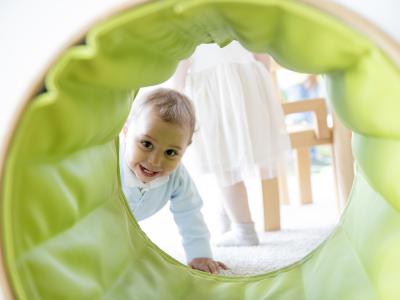
Our aim is to support and strengthen each child according to their personal needs and individual development. We enable children to learn in a stimulating, prepared environment that is characterized by security and well-being. In everyday daycare, we support the development of each individual child by awakening their natural curiosity, observing developmental situations and practicing participation in everyday situations. In our daycare centers, we create ideal conditions through trusting relationships so that children can engage with their environment together with other children in a self-determined, creative, imaginative and joyful way.
Dedicated employees – the heart and soul of our daycare center
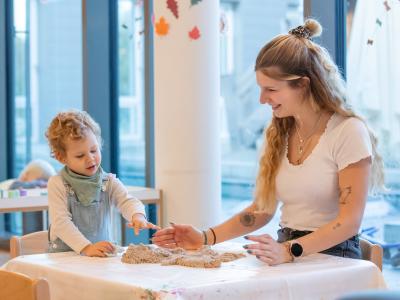
We value our educational staff as competent educational companions for the children entrusted to us. This is why we create the ideal conditions for them to carry out their work with commitment, professionalism, initiative and warmth. We value each team member with their individual strengths, support their free development and growth and treat everyone with respect, support and backing.
Satisfied parents – appreciative cooperation
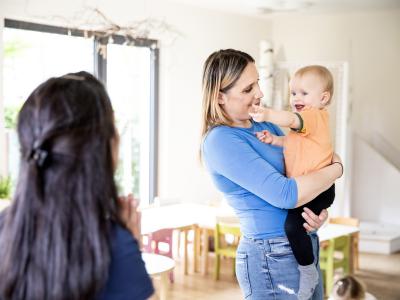
We would like to make it easier for you as parents to combine family and career with contemporary offers. At the same time, we want to work constructively and respectfully with parents in the interests of their child. We value a good educational partnership that is characterized by mutual trust and open communication. We take into account the individual circumstances of each family system.
Eltern Campus – gemeinsam wachsen. Für die beste Entwicklung Ihres Kindes.
Elternsein ist eine wundervolle, aber auch herausfordernde Reise. Bei der Wichtel Akademie begleiten wir Sie nicht nur in der Entwicklung Ihres Kindes – wir möchten Sie auch als Eltern stärken, inspirieren und unterstützen.

Mit unserem digitalen Eltern Campus bieten wir Ihnen ein neues, exklusives Format: Monatlich erwarten Sie spannende, praxisnahe Online-Vorträge zu aktuellen Themen rund um Erziehung, kindliche Entwicklung und den Familienalltag – gehalten von unseren erfahrenen Pädagoginnen, Pädagogen und Expert:innen.
Hier erhalten Sie fundiertes Fachwissen, verständlich erklärt und liebevoll aufbereitet – damit Sie Ihren Elternalltag mit noch mehr Sicherheit, Leichtigkeit und Freude gestalten können.
Der Eltern Campus ist ein besonderes, kostenloses Angebot für alle Wichtel-Eltern – als Ausdruck unserer Wertschätzung und unserer gelebten Partnerschaft mit Ihnen. Die Termine und Themen des Eltern Campus werden über unsere Eltern-App bekanntgegeben. Eltern, die bereits einen Betreuungsvertrag unterschrieben haben, deren Kind aber noch nicht in der Kita gestartet ist, erhalten die Einladungen direkt per E-Mail. Gemeinsam. Für starke Kinder und starke Eltern.
Learning with joy: our understanding of education
Positive early childhood learning experiences are the best basis for a successful educational biography. This is why we focus on the acquisition of learning methodological skills and the development of a willingness for lifelong learning in our facilities . They form the core of our understanding of education.
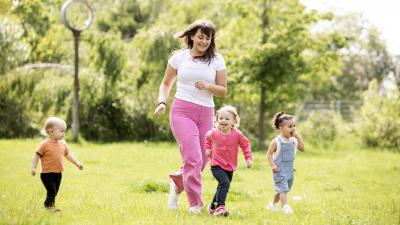
We want children to enjoy learning and gain an understanding of learning processes. Children want to actively contribute with all their senses and previous experiences. The basis of our educational approach is therefore to recognize, strengthen and further develop the child's self-activity during the course of the day. Education in the elementary sector means interacting with the child and developing their self-education processes. A good quality of relationship between our educational staff and the children plays an important role in this. As trusted caregivers, our specialist staff accompany the children in everyday situations and educational processes. They provide them with protection and a sense of security, show a genuine interest in the children's topics and perceptions and offer them age-appropriate challenges. In our crèches and kindergartens, we advocate an open-minded education. We want to awaken and nurture children's interest in other cultures, languages and customs. Our educational staff exemplify openness and curiosity towards individual lifestyles and address these in a child-friendly way.
Strengthening basic skills
Our individual support for each child aims to develop and strengthen their basic skills. These are the basic skills that people need to be able to interact with each other.
Personal competence
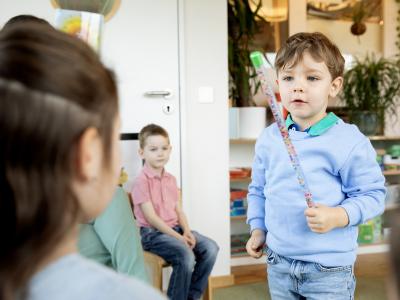
Personal skills are crucial for a happy life. A child who receives loving care is more confident. This is why we support children on their path to greater self-confidence. This leads to positive self-perception and strengthens secure attachments and self-confidence. Our educational staff listen and give positive feedback.
Motivational competence
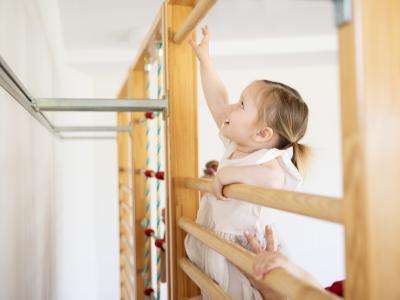
Motivational skills include autonomy, competence, self-efficacy and self-regulation. Children should learn to motivate themselves. In our daycare centers, we create situations in which they can act independently. During free play time, they choose between different play materials and activities and experience themselves as competent and self-efficacious.
Social and emotional skills
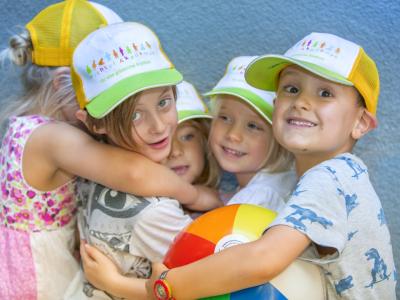
In addition to cognitive skills, children also develop social and emotional skills. They gain a variety of social experiences, build relationships and learn to find their role. Mutual help, consideration, compromise and responsibility are part of everyday life. They recognize and accept wishes, needs, strengths and weaknesses in themselves and others.
Social competence
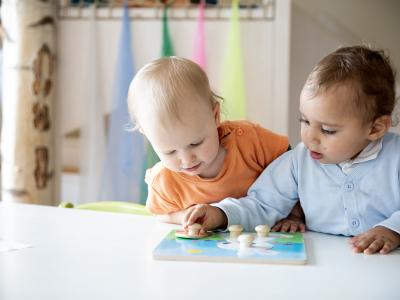
Social skills enable good relationships with adults and children. Children understand the world through social exchange and mutual learning. In our daycare centers, children learn responsibility, supported by feedback and pedagogical guidance. Consideration and respect, especially towards weaker children, are important.
Resilience
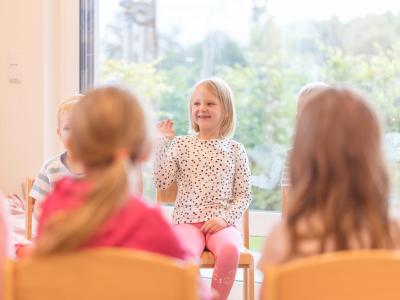
Resilience is the ability to deal constructively with stress and emerge stronger from it. It promotes positive development, health, well-being and a high quality of life. Resilience makes it possible to deal with individual, family and social changes. We help children to become resilient and see challenges as opportunities.
Carefree learning: free play at the Wichtel Akademie
Structured learning processes are important for positive child development. However, carefree free play also deserves its place as the most elementary form of learning. In our daycare centers, we bring play and learning into harmony: our educational routine offers children plenty of space for intuitive, independent and playful exploration, alone or with other children. This contributes significantly to their personal development.
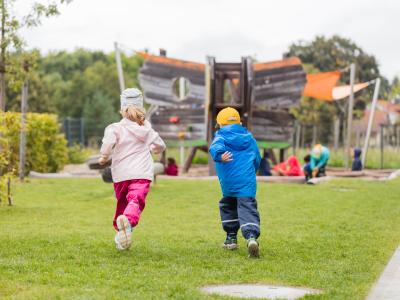
Free play takes place both on our premises and in our gardens, parks and playgrounds. Children instinctively discover their environment and decide for themselves what, where, with whom and for how long they want to play. They experiment, solve problems on their own and practice social behavior, playfully strengthening their concentration, motor skills, perseverance, consideration and patience. Our educational staff observe and document free play in order to gain important insights into the children's interests and stage of development. These findings are incorporated directly into the educational work so that each child can receive individual support.
Five areas of education in the daycare center
The Bavarian Education and Upbringing Plan (BayBEP) comprises eleven areas of education. In line with our understanding of education, we have grouped these into five thematic blocks. Our educational staff carry out daily activities with the children in the respective educational areas and document these on talking walls and in the parent app.
Aesthetics, art, music
From birth, children perceive the world with all their senses and have their first aesthetic experiences. Art strengthens children's sensory perception and ability to experience. Through various stimuli, children learn to use their imagination in a playful way and to express their experiences, thoughts and emotions creatively.
Movement, rhythmics, health
Movement is one of the basic forms of human expression. Through movement, young children gather impressions of the world, acquire knowledge about their own bodies and communicate with their environment. Rhythmics is a holistic approach that harmonizes movement, music, language and rhythm. Health encompasses the physical as well as the mental, spiritual and social well-being of children. Education in these three areas is of key importance in our daycare centers.
Mathematics, natural sciences, environment
The ability to think mathematically is the basis for lifelong learning and is required in almost every field of science, technology and business. Children develop mathematical thinking by engaging with materials and communicating with adults. On the one hand, environmental education and learning relates to children's experiences and adventures in nature itself, but environmental protection and sustainability are also addressed here.
Values, emotionality & social relationships
Ethical education and upbringing support daycare children in dealing with questions about life and death, meaning, values and the world. They are central to the educational understanding of our daycare centers, as they form the basis for children to develop their own view of the world, find answers and form their own opinions.
Language, literacy, media
The aspects of education and language are already closely linked in daycare. Language skills are a basic prerequisite for a child's emotional and cognitive development. At the same time, it is a key qualification for later academic and professional success as well as for social integration. Literacy refers to skills and experiences related to the culture of books, rhymes, storytelling and writing. Media literacy promotes the conscious, critical and responsible use of media.